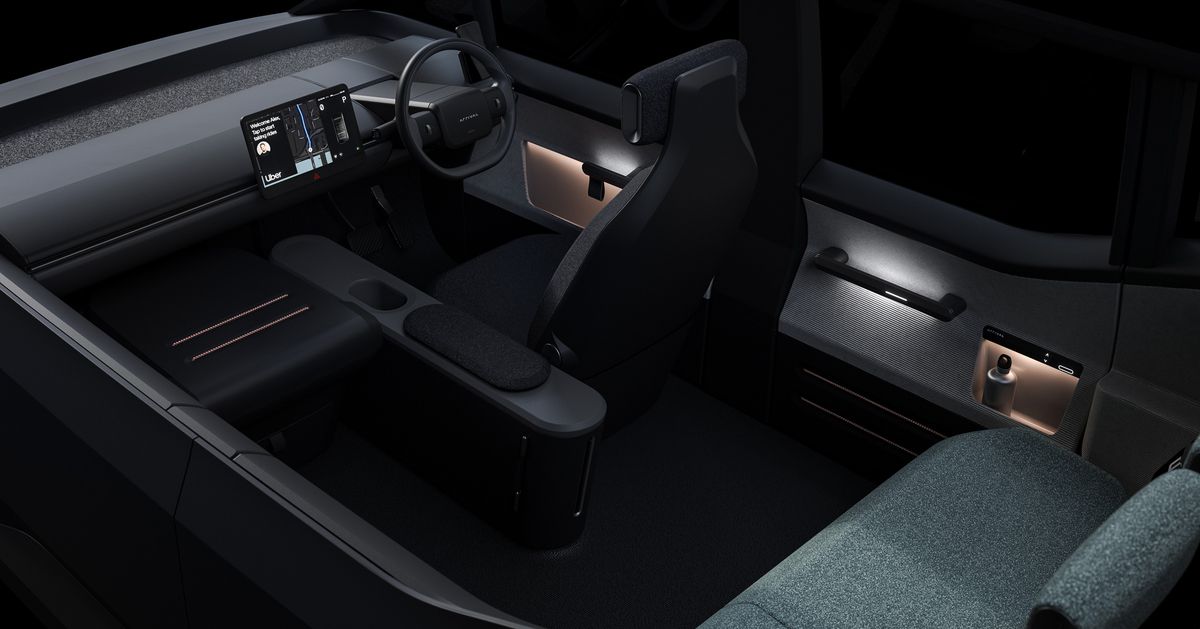
UK-based EV startup Arrival is working with Uber to develop an electric car that will be “purpose-built” for ride-hailing. Arrival plans to put the car into production in late 2023 and says it will not be exclusive to Uber. Instead, the startup says the goal is to create an affordable vehicle that would appeal to the millions of ride-hailing drivers around the world.
It’s another vote of confidence in Arrival, which just became a publicly traded company in March after merging with a special purpose acquisition company, or SPAC. Founded in 2015, Arrival is also developing electric delivery vans (with UPS as a customer) and buses. It also has backing from Hyundai and Kia.
Arrival and Uber released a handful of renderings of the new car’s interior and said a final design will be revealed by the end of the year. Between now and then, the companies plan to get some drivers involved in the design process, too.
What’s being teased in the images that were released is not some radical rethink of what a car should be like on the inside — in fact, in comparison to the concept cars we see every year at auto shows around the world, it’s quite familiar. There’s a large horizontal screen mounted to the dashboard, similar to what’s in Tesla’s Model 3 and Model Y (and the forthcoming Model S and Model X refresh), and the steering wheel is also quite similar to what’s found in a Tesla, with just two scroll wheels and no driver display.
But there are a few subtle differences that Arrival says could enhance the ride-hailing experience for both drivers and passengers. The driver’s seat is ergonomically designed to ease the physical strain of sitting in a car for hours on end. The front passenger seat folds up to create more leg room. There’s a bench-style seat in the rear, which makes it easier to get in and out of the vehicle. And there are small, lighted cubbies and handrails on the inside of each door.
The goal is to make “hundreds of small improvements, changes, and tweaks to the design that perhaps haven’t been applied before,” according to Tom Elvidge, Arrival’s senior vice president of mobility.
Electric vehicles can make a lot of sense in a ride-hailing setting. They tend to have fewer moving parts than internal combustion cars, and therefore require less maintenance and upkeep. They’re also inherently compliant with the zero-emission zones that have been adopted in cities across Europe, as well as broader internal combustion bans that are on the horizon. But electric vehicles are, currently, more expensive than the cheapest internal combustion or hybrid cars.
The goal is to design an affordable vehicle from the outset, Elvidge says, though Arrival believes it can broadly reduce the cost of manufacturing electric vehicles by using so-called “microfactories,” or highly automated, small-footprint facilities where it plans to build its vehicles.
Arrival has yet to prove that strategy can work. Like many of its SPAC peers, it is still in the developmental phase and has yet to actually sell any production vehicles. Uber has quietly poked at a number of electric vehicle startups over the last few years but never struck any deals, though it has recently cleaved a number of money-losing divisions, like the one focused on autonomous vehicles and the one dedicated to flying taxis. The partnership with Arrival, then, may be a sign that it’s ready to try to execute on its promise to make 100 percent of its rides happen in electric vehicles in the US, Canada, and Europe by 2030 — a goal Uber said it would reach by partnering with a variety of companies across the transportation industry.
"electric" - Google News
May 04, 2021 at 06:01AM
https://ift.tt/3h6qtLk
Arrival and Uber are working on an electric ride-hailing car - The Verge
"electric" - Google News
https://ift.tt/2yk35WT
https://ift.tt/3bbj3jq
No comments:
Post a Comment